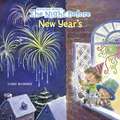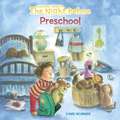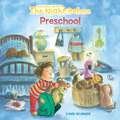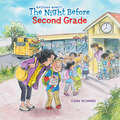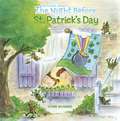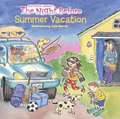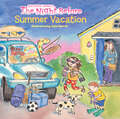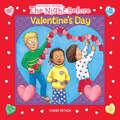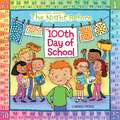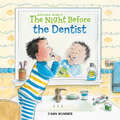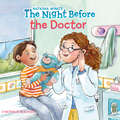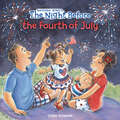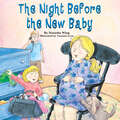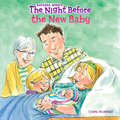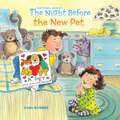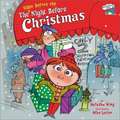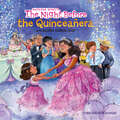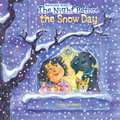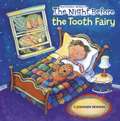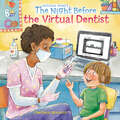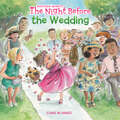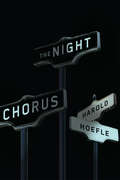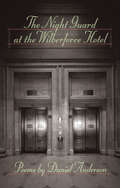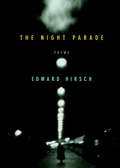- Table View
- List View
The Night Before New Year's
by Natasha Wing Amy WummerThe newest title in Natasha Wing's bestselling Night Before series! It's the night before New Year's, and the whole family is determined to stay up until midnight! Everyone's stocked up on sparkly streamers and festive party hats, but after a night filled with card games and too many cupcakes, the little ones are getting sleepy...Can they make it until the clock strikes twelve?
The Night Before Preschool
by Natasha Wing Amy WummerIt's the night before preschool, and a little boy named Billy is so nervous he can't fall asleep. The friends he makes the next day at school give him a reason not to sleep the next night, either: he's too excited about going back! The book's simple rhyming text and sweet illustrations will soothe any child's fears about the first day of school.
The Night Before Preschool (The Night Before)
by Natasha WingIt's the night before preschool, and a little boy named Billy is so nervous he can't fall asleep. The friends he makes the next day at school give him a reason not to sleep the next night, either: he's too excited about going back! The book's simple rhyming text and sweet illustrations will soothe any child's fears about the first day of school.
The Night Before Second Grade (The Night Before)
by Natasha WingGrab your backpack and get ready for the second grade in the latest big moment to be celebrated in Natasha Wing's best-selling series!It's the night before a young boy's first day of second grade, and he's excited. He's spent all summer reading and preparing for the year ahead, and he can't wait to learn more about what fun surprises second grade has to offer. Join him and his friends on their journey through the new school year in this delightful story, told in the style of Clement C. Moore's classic tale.
The Night Before St. Patrick's Day
by Natasha Wing'Twas the night before St. Patricks--the day to wear green. Not a creature was stirring, except Tim and Maureen. So what do these two kids who can't fall asleep do? They set traps all over the house, hoping to catch a leprechaun who will lead them to his pot of gold. But they don't realize just how tricky leprechauns can be!
The Night Before Summer Vacation
by Natasha WingFrom the book: Mom grabbed the graham crackers and stuff for the s'mores. We carried out helmets, the canoe, and the oars. "Remember my raft, my snorkel, and bike, Plus Pete's doggy bowls, and Jimmy's new trike." There sure is a lot of packing to do before vacation! While a little girl's family remembers the fun they've had on past summer trips, will they forget to bring something very important on this one? Yes! But you'll never guess what! Other books by Natasha Wing are available in this library.
The Night Before Summer Vacation (The Night Before)
by Natasha WingA little girl and her family are getting ready to go on vacation . . . or at least they are trying to. In the effort to pack everything that will be needed, there's bound to be something overlooked, and what that is provides a funny ending to this meter-perfect "twist" on Clement Moore's classic.
The Night Before Valentine's Day
by Natasha WingAll the kids are getting ready for the sweetest holiday of the year. Join in on the card-making fun and then come along to school the next morning for a day of parties and games!
The Night Before Valentine's Day (The Night Before)
by Natasha WingIt's the sweetest holiday of the year! Celebrate love and Valentine's Day with card-making, tasty treats, and more in this installment of Natasha Wing's best-selling series.Join in on all of the colorful fun, and then come along to school the next morning for a day of parties and games!
The Night Before the 100th Day of School (The Night Before)
by Natasha WingThe 100th day of school is almost here and one student is desperate to find 100 of anything to bring to class. Then all of sudden inspiration strikes, and he comes up with a surprise that makes the 100th day celebration one to remember! This hilarious story of a popular school tradition offers a perfect modern twist on Clement C. Moore&’s classic poem.
The Night Before the Dentist (The Night Before)
by Natasha WingGrab your toothbrush and get ready for a trip to the dentist in the latest big moment to be celebrated in Natasha Wing's best-selling series!It's the night before a young boy's check-up with the dentist. He's lost four teeth, and two big ones have come in already! So what does he do? He brushes and brushes his teeth to make sure his smile is super bright, of course! Join him on his journey to explore the ins and outs of the dentist's office in this delightful story, told in the style of Clement C. Moore's classic tale.
The Night Before the Doctor (The Night Before)
by Natasha WingA little boy gets ready to go to his doctor's appointment!A little boy prepares to visit the doctor! He can't wait to show the doctor how much he's grown as he gets his eyes, ears, and heart checked, and will be extra brave when it's time to get a shot. Join him at the doctor's office in this installment of the Night Before series, told in the style of Clement C. Moore's classic tale.
The Night Before the Fourth of July (The Night Before)
by Natasha WingThe twentieth title in the bestselling Night Before series is the perfect summer treat! It's the night before the Fourth of July and all across the United States people are getting ready for hot dogs and fireworks. Decked in red, white, and blue, a family heads to a parade, hosts a backyard BBQ with friends and family, dodges an afternoon thundershower, and of course, watches a fireworks show. The Night Before the Fourth of July captures all the fun, excitement, and pride of the best summer holiday!
The Night Before the New Baby (The Night Before)
by Natasha Wing'Twas the night before baby decided to come,Mom's belly was big and as tight as a drum.We'd painted and papered the nursery with care,In hopes that the new baby soon would be there.A brand-new baby is about the join the family! Join in the excitement as a littler girl awaits the arrival of her new brother . . . or sister?
The Night Before the New Baby (The Night Before)
by Natasha WingA little girl and her parents prepare to welcome a new member to their family in this addition to the Night Before series!A brand-new baby is about the join the family! The little girl helps her parents decorate the nursery and imagines all the fun things she and her new sibling will do. She'll help feed them, read them stories, and play! Join her and the family as they prepare for the baby's arrival in this installment of the Night Before series, told in style of Clement. C. Moore's classic tale.
The Night Before the New Pet (The Night Before)
by Natasha WingThere's a new pet on the way—the moment every kid dreams of!It's the night before the adoption of a puppy and the whole family can hardly wait. Everyone helps prepare: they buy treats, set up a crate, and discuss what they should name the pet. When they get to the shelter, they see all kinds of dogs — until they spot the perfect one for them. But a last-minute surprise makes things twice as exciting!
The Night Before the Night Before Christmas
by Natasha WingTwo days before Christmas, an overworked family laments with a familiar rhyme that they had too much to do, Our tree wasn't up yet and Mom had the flu. A new twist on an old favorite which captures both the delightful spirit of the holiday as well as the chaos that often goes along with it.
The Night Before the Quinceañera (The Night Before)
by Natasha Wing Gloria García DíazA little girl and her family are preparing for her older sister's quinceañera!&’Twas the night before the quinceañeraand all through the halls,our family was busyanswering calls.A little girl is getting ready to celebrate her older sister's quinceañera! There's going to be a huge celebration with all their friends and family for her sister's fifteenth birthday. They will do special dances, eat lots of food, and wear beautiful dresses. But when the quinceañera's crown goes missing, they're not sure the celebration can go on. Will the party be saved? You'll have to read along to find out!Told in the style of Clement C. Moore's classic tale, this storybook is the perfect gift to celebrate quinceañeras!
The Night Before the Snow Day (The Night Before)
by Natasha WingCould it be the night before a Snow Day?It's nighttime and snow is falling hard. Will the town be snowed in? Will there be a snow day? Odds are looking good in this newest Night Before book for the kids who dream of snowball fights, sledding, and the possibility that it may snow again tomorrow!
The Night Before the Tooth Fairy
by Natasha WingIt wiggles, and waggles, and wiggles some more, but this little boy's stubborn tooth just won't come out! He hopes it will fall out soon, because he can't wait to meet the Tooth Fairy! This humorous tale based on Clement C. Moore's classic poem is a perfect addition to the best-selling series. Illustrated by Johansen Newman.
The Night Before the Virtual Dentist (The Night Before)
by Natasha WingGrab your toothbrush and get ready for the dental team to pay a visit in Natasha Wing's celebrated series!It's the day before a dental team visits a child's classroom to check their teeth. They'll look for cavities and for healthy gums to make sure their smiles stay super bright and healthy! Join them on their dental check-up in this delightful story, told in the style of Clement C. Moore's classic tale.The community-based dental home model is an innovative way to provide dental care that maximizes keeping kids healthy in the community and minimizes the need to travel to a dental office.
The Night Before the Wedding (The Night Before)
by Natasha WingHere comes the bride...and the flower girl! This springtime wedding is the latest occasion to be celebrated in Natasha Wing's best-selling series.It's the night before her sister's wedding, and one little flower girl sure is excited! But will complications on the morning of the big day bring down everyone's happy moods? Any little girl who has dreamed of being a flower girl--and their numbers are legion--will love this fun, rhyming story told in the style of Clement C. Moore's Christmas classic.
The Night Chorus (Hugh MacLennan Poetry Series #44)
by Harold HoefleA whistling through teeth. / He shuts his eyes but still sees / the red glow of exit signs. Harold Hoefle's The Night Chorus rises out of forests and country roads, bars and buses, cities and small towns. These locales are the haunts of outsiders ranging from travellers and farmers to a soldier, a drug addict, a refugee, and the murdered. The past clings in these stark, evocative poems, "memory a closet of clothes / that hang from bent wire." In the tradition of songwriters like Gordon Lightfoot and Gord Downie and poets such as Al Purdy, Karen Solie, and David O'Meara, The Night Chorus presents so-called "obscure" lives, where dark and playful humour collides with historic and mythic characters including Ovid and Dante, Odysseus and Desdemona. Using lyric poetry and the ghazal, the prose poem and the elegy, The Night Chorus brims with images as sharp as wild geese scrawling letters against an evening sky and as humble as "pots of plum dumplings and still-warm soup." Bookended by a sequence of lyrics inspired by cross-country road trips, Hoefle references iconic places like Black Dog Road and Seldom Seen and peoples the landscape with imagined characters. Their voices – damaged, rough, intimate – will echo in the reader's mind.
The Night Guard at the Wilberforce Hotel (Johns Hopkins: Poetry and Fiction)
by Daniel AndersonIn his third collection of poems, Daniel Anderson ponders and celebrates the images, sounds, and tastes of contemporary life.The poems in The Night Guard at the Wilberforce Hotel navigate the evanescent boundaries between the public and the private self. Daniel Anderson’s settings are often social but never fail to turn inward, drowning out the chatter of conversation to quietly observe the truths that we simultaneously share and withhold from one another—even as we visit friends, celebrate a young couple’s union, or eavesdrop on the conversations of others. These twenty poems include meditations on teaching hungover undergraduates, wine tasting among snobs, and engaging the war on terror from the comfort of the suburbs. They are alternately driven by ornamental language that seeks to clarify and crystallize the beauties of our common world and the poet’s faith that fellowship ultimately trumps partisanship. Even as they weigh and measure the darkness of the heart and the sometimes rash and stingy movements of the mind, the poems refrain from pronouncing judgment on their characters. As much as they ponder, they also celebrate in exact, careful, and loving terms the haunting and bracing stimuli from which they originate.
The Night Parade
by Edward HirschFrom its opening epigraph, On Love takes the subjects of and fusion, autonomy and blur. The initial up separateness progression of fifteen shapely and passionate lyrics (including a sonnet about the poet at seven, a villanelle about the loneliness of a pioneer woman on the prairie, and an elegy for Amy Clampitt) opens out into a sequence of meditations about love. These arresting love poems are spoken by a gallery of historical figures from Denis Diderot, Heinrich Heine, Charles Baudelaire, and Ralph Waldo Emerson to Gertrude Stein, Frederico Garcia Lorca, Zora Neale Hurston, and Colette. Personal, literary, On Love is formally adept and moving, a volume to be read and reread.
